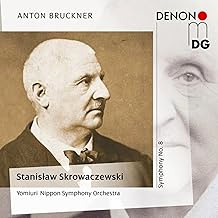

I've always strongly believed that Anton Bruckner (1824-1896) composed only one symphony which he then cloned nine times over (eleven if you account for his early attempts with Nos. 0 and 00). Just like he constantly revised each individual numbered symphonies, each one of those was a revision of the original one. Of course, he would alter the external skin by writing in a different key, or changing the orchestration, but the bones, the blueprint, the skeletal structure remained unchanged. Proportionately sized movements, similar harmonic progressions, intervals and modulations, similar rhythmic gestures, typical unison thematic emphasis, and worst of all, development by constant repetition rather than diverse emotive outlooks. For a period of time during his life he suffered from numeromania (an obsession with counting). He had a habit of counting the bricks and windows of buildings, and constantly counting the number of bars in his massive scores, to make sure that they were proportionately exact. Was he possibly suffering from a form of autism or obsessive-compulsive disorder? So imagine my feelings of validation when reading the booklet notes I came across this statement: The conductor Hermann Levi (1839-1900), in whose eyes the Seventh Symphony had found unreserved favour, was shocked by the new symphony. As he confided to Bruckner's pupil and assistant Josef Schalk: "I find the instrumentation quite awful, and what particularly appalled me was the great similarity to the Seventh, the almost stereotypically repeated formal pattern."
Nonetheless, Bruckner's 1887 Symphony No. 8 in C minor was, and remains to this day, a symphonic masterwork of epic proportions and ideals. It's overall feel is Wagnerian in scope and outlook. This new 'live' recording from January 2016, featuring the Yomiuri Nippon Symphony Orchestra conducted by Stanislaw Skrowaczewski, certainly reveals all of its musical, as well as philosophical magnitude. From its oddly ominous and foreboding introduction to its devastating coda, the musicians of the orchestra along with Skrowaczewski have an unyielding grasp on its development. In particular, the brass section of the orchestra is amazing on all counts. For example, the rather soft brass choir passages at the end of the Adagio movement are simply breathtaking in their balance and dynamic control.
And here's the clincher. Conductor Stanislaw Skrowaczewski was 92 years old when this live performance took place in Tokyo. And yet he drove the score forward with the agility, energy and power of a 25 year old. For example, under his keen eye for balance and sense of proportions, the opening of the final movement (audio clip below) sounds like a brave knight rushing into battle on a powerful stallion, when compared to conductors like Sergiu Celibidache who waddle along like a sumo wrestler on a hippo. There's always a tangible sense of purpose to his direction, as witnessed in an older recording of his of Beethoven's 9th. And according to the booklet notes he has been awarded the Gold Medal of the Mahler-Bruckner Society, and his complete Bruckner symphonies with the Saarbrücken Radio Symphony Orchestra were acclaimed worldwide and won the Cannes Classical Grand Prix of 2002. Add to all of this the superb Denon audio engineering qualities which capture the depth and breadth of the orchestra, and you're in for a captivating listening experience.
Jean-Yves Duperron - January 2024 Opening of Final Movement